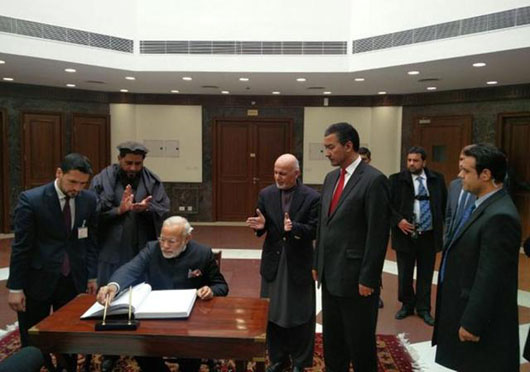Kabul, Dec 25: Prime Minister Narendra Modi todayinaugurated the Parliament building which has been constructed by India at a cost of USD 90 million here.

The new parliament building in Afghanistan will stand as a symbol of ties between India and Afghanistan, Prime Minister Narendra Modi said after the inauguration ceremony.
"It will stand as an enduring symbol of the ties of emotions and values, of affection and aspirations that bind us in a special relationship," the prime minister said.
"The great Afghan people waged an epic struggle of courage and resolve to shape their future with vote and debate and not gun and violence."
Modi said he stands on behalf of "1.25 billion friends in India in admiration for your achievements and in gratitude for your friendship."
He said the day was special as it was former prime minister Atal Bihari Vajpayee's birthday, adding he was "deeply touched" that a block in the new building was named 'Atal block'.
Earlier, Khaama press reported that Ghani and Modi toured the parliament building, including the main session hall in the presence of guests, including member of the Afghan parliament.
PM has arrived on a visit during which he is expected to hold talks with Afghan leadership, including President Ashraf Ghani.
Modi who flew in the wee hours from Moscow, where he had annual summit talks with Russian President Vladimir Putin, was received by Afghan National Security Adviser Mohammad Hanif Atmar and deputy Foreign minister Hekmat Karzai.
"From Russia to Afghanistan. A pre-dawn arrival in Kabul begins a day of engagements with another dost," External Affairs Ministry Spokesperson Vikas Swarup tweeted.
On his arrival Modi said, "delighted to be in Kabul among friends. Will meet Ashraf Ghani, Chief Executive Officer (CEO) Abdullah Abdullah and former President Hamid Karzai".
Modi will be holding talks with Afghan leaders on key bilateral issues, including security co-operation and discuss the ways to help war-torn country where India has committed over two billion assistance.
The Prime Minister will also be inaugurating the Parliament building and expected to address the Afghan lawmakers.
The Parliament building project, which was initially conceived at a cost of USD 45 million, was started by India in 2007 as a mark of friendship and cooperation to help rebuild Afghanistan.
Significantly, prior to the Prime Minister's visit, India has delivered three Mi 25 attack helicopters to Afghanistan, in what is seen as a shift in its strategy towards the strife-torn country.
Defence sources said that three such choppers have already been delivered to the Afghan government, which will boost its capability against Taliban terrorists.
The Parliament building project, which was initially conceived at a cost of USD 45 million, was started by India in 2007 as a mark of friendship and cooperation to help rebuild Afghanistan.
Situated between historic landmarks King's Palace "Darulaman" and the Queen's Palace - the building has elements of Mughal and modern architecture and has Asia's largest dome as its key feature.
The building will house the Wolesi Jirga (Lower House) with a seating capacity of 294, a 190-seat Meshrano Jirga (Upper House), besides other facilities like conference hall and press room.
Meanwhile, Mi 25 choppers were taken to Afghanistan in a C-17 transport aircraft of the Indian Air Force, sources said.
While Afghanistan has repeatedly sought India's support in beefing up its military's fighting capability in terms of machinery, India had shied away till now.
The development came after the recent visit of Afghan National Security Adviser Mohammad Hanif Atmar to New Delhi.
Afghanistan has till now been dependent on the US air support in its operations against the Taliban.
However, with the American forces pulling out that country to a large extent, the Afghan forces will be using the Mi 25 now.





Comments
Add new comment